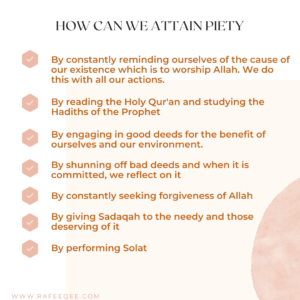Dawwah, Islamic Principles, Religion, Tawheed
Piety and a Contented Soul
Piety and a Contented Soul
Taqwa is the Islamic word that connotes “Piety, Mindfulness and God Consciousness.” Piety is the root of Islam. That is, being mindful and conscious of our actions which in turn depicts us as better Muslims. When a person fears Allah, he or she would be cautious of not committing sins. Taqwa breeds obedience and total submission to the will of Allah.
In Suratul Baqarah: 2, Allah says:
“This is the Book of Allah, there is no doubt in it. It is a guidance for the pious.” This verse indicates to us that Almighty Allah has made the Quran a guide for the Muslims and whosoever follows it will not be misguided.

Hence, having a firm stance in that which Allah has revealed helps us in protecting our belief from external forces and influences. It also makes it easier for us to rectify our affairs before Allah; safeguard us from doubts and aspersions of whether we are on the right path or not.
Allah says in the Quran 49:13
“…Surely the noblest of you, in Allah’s sight, is the one who is most pious of you. Surely Allah is All-Knowing, All-Aware.”
Also in Quran3:76 “…Why not? Whoever fulfills his pledge and fears Allah, then, Allah loves the God-fearing”.
These verses explain to us that with Taqwa, we are able to perform our obligatory duties; seek Allah’s mercies and provisions while hastening to prayer, and performing it diligently because Taqwa breeds a contented heart that accepts the will of Allah with ease. It protects the heart from irrelevancies as stated in the Quran: “And those who are guided – He increases them in guidance and gives them their righteousness.” (Quran 47:17)
Taqwa helps us distinguish between truth and falsehood as we tend to know when we are deviating. It nourishes our hearts and guides them and as well serves as a basis for all our actions.
Allah says in Quran8:29 “O you who believe, if you fear Allah, He will provide you with a criterion (to distinguish between right and wrong) and will write off your evil deeds and will forgive you. Allah is the Lord of great bounty.”

Can the soul reach contentment through piety?
Yes, A Pious Muslim always has a contented heart that exists in peace and tranquility for he knows that nothing can happen without the knowledge of Allah, and whatever has been destined for him will surely reach him. Through our heart’s contentment, we seek provisions within the limits of Allah. We don’t lust after that which has not been allowed for us and we are grateful for that which Allah has provided for us. We feel happy, valuable, worthy, and content.
Ibn‘Alawiyyah reported: Yahya ibn Mu’adh, may Allah be pleased with him, said,
“Piety has two types: outward piety and inward piety. As for the external, it is to not make any movement but for the sake of Allah. As for the internal, it is to not allow anything into the heart besides Allah Almighty.”Source:al-Futuwwahlil-Sulamī1/27
Piety is also the tool for self-improvement and self-development which can, in turn, improve society. Paying attention to the effect of our actions on others increases our piety. Whenever we remember that Almighty Allah sees everything we do, we become mindful of our deeds. It also pushes believers to constantly seek the forgiveness of Allah when they transgress and resolve to not partaking in the sin anymore. Abu Darda reported: The Messenger of Allah, peace, and blessings be upon him, said,
“Verily, before you is a burdensome path to traverse. No one is saved from it except everyone who fears falling into sin.” Source: Musnad al-Bazzār 4118
How can we attain piety:

- By constantly reminding ourselves of the cause of our existence which is to worship Allah. We do this with all our actions.
- By reading the Holy Qur’an and studying the Hadiths of the Prophet.
Jabir reported: The Messenger of Allah, peace, and blessings be upon him, said,
“Among people who recite the Quran with the best voice are those who, when you hear them, you consider them fearful of Allah.” Source: Sunan Ibn Mājah 1339
- By engaging in good deeds for the benefit of ourselves and our environment.
- By shunning off bad deeds and when it is committed, we reflect on it.
On the authority of Abu Dharr Jundub ibn Junadah, and Abu Abdur-Rahman Muadh bin Jabal (may Allah be pleased with him), that the Messenger of Allah (peace and blessings of Allah be upon him) said: Have taqwa (fear) of Allah wherever you may be, and follow up a bad deed with a good deed which will wipe it out, and behave well towards the people. It was related by at-Tirmidhi, who said it was a Hasan (good) hadeeth, and in some copies, it is stated to be a Hasan Saheeh hadeeth.
- By constantly seeking forgiveness of Allah
- By giving Sadaqah to the needy and those deserving of it.
- By calling people to the right path through our actions.
- By performing Solat.
May Almighty Allah make our hearts firm on the path of righteousness.

